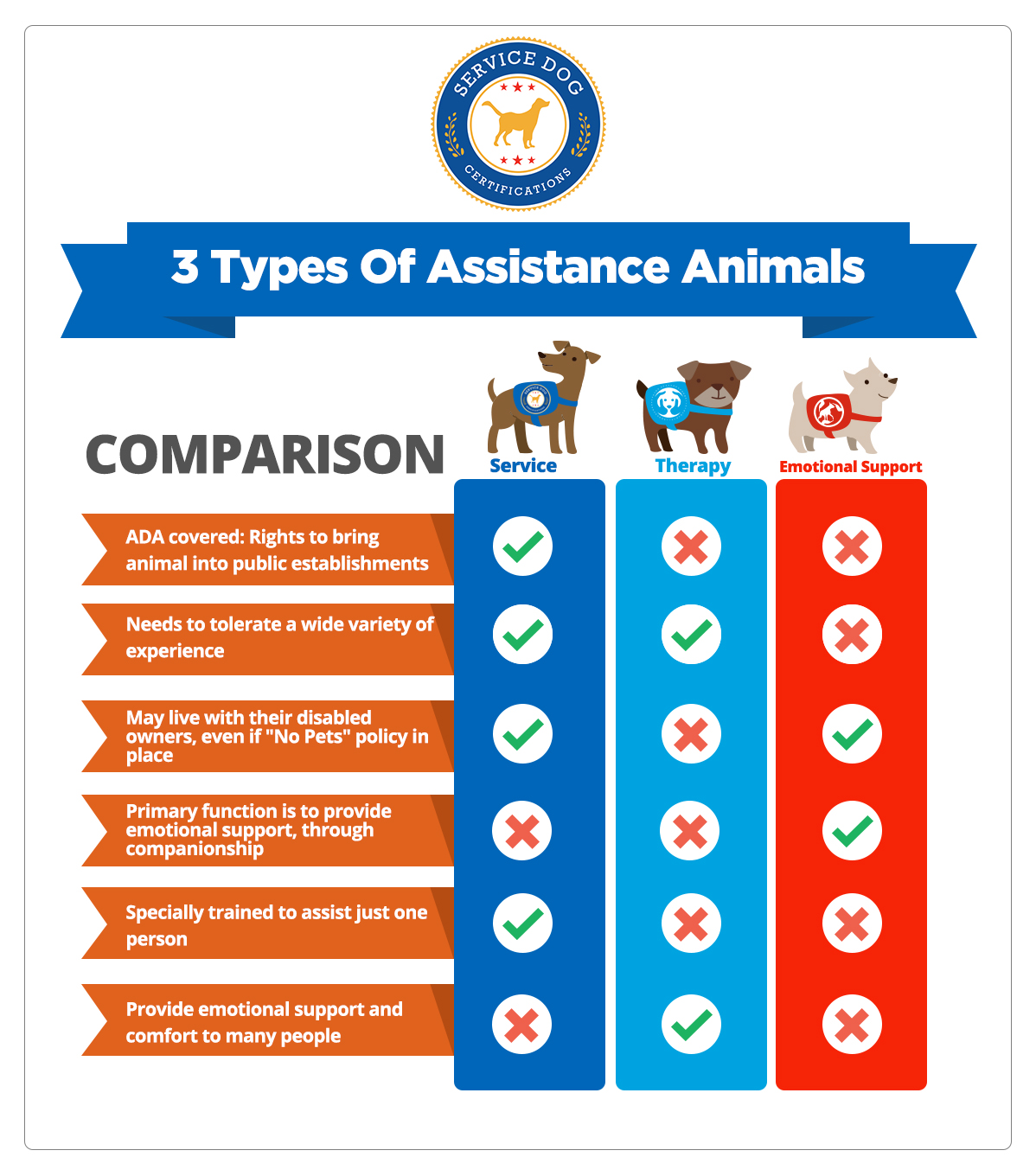Can I Take a Service Dog to College?

Service dogs are not just for the visually or hearing impaired individual. Service dogs have lent a helping paw to individuals with a broader range of physical and psychological conditions.
But what if you are a student and need a service dog? Will colleges allow dogs on campus and into the classroom?
Read on for some important information to answer the question, “can I take my service dog to college?”
Service Dogs Are NOT Emotional Support Animals
There is a difference between a Service Dog and an Emotional Support Animal, which will make a difference when you seek to bring your dog to college.
The service dog is a canine specially trained to perform a task for its handler with a physical or mental health disability. This may include leading the person with a visual or hearing impairment, mobility support, or alerting to a drop in blood sugar or an oncoming seizure and helping to overcome certain psychiatric disabilities.
The emotional support animal, on the other hand, is not trained for a task but instead provides emotional comfort and help to improve the symptoms of certain psychological disorders.
Even though the Fair Housing Act covers both — service animals and emotional support animals — in housing areas and dormitories, the laws governing where a task-trained service dog is permitted go far beyond.
The Disability Laws and the Service Dog in College
The Americans With Disabilities Act (ADA) is a federally protected law that supersedes all local and state laws regarding the use of service dogs in schools and colleges.
According to the ADA, a student is permitted to bring a service dog to college when the dog helps to expand their independence. Although the school must provide appropriate access for both the student and the service dog to classrooms and housing, they do not have to provide care, food, or relief areas for the canine. The Disabilities Education Improvement Act requires school districts to allow a service dog to accompany a student with a disability to school.
Colleges must make reasonable accommodations for service dogs, meaning they must allow the service dog into areas like classrooms, lecture halls, and cafeteria, as long as it doesn’t create an undue hardship on the facility.
ServiceDogCertifications.com
According to the ADA, a fear of dogs or allergies are not reasons to ban the service dog from the college. If one of these situations presents itself, then accommodation for both the student with the service dog and the allergic or fearful person must be given (for example, by moving the dog and the affected person to opposite sides of the classroom).
Service Dog Certification
Although it is not a legal requirement, getting your service dog registered and having service dog accessories may make things easier when it comes to accessing a college dorm or the classroom. Again, these items do not confer service dog status and are never substitutes for properly qualifying for a service dog.
To have a service dog, you must have a qualifying disability and your dog must be fully trained to perform a job or task relating to that disability. If and only when you are fully qualified, then you can consider things like registration, ID cards and vests.
To have a fully registered service dog for college, follow these steps:
- Find the right service dog
Be sure your service dog is of the right age and breed for the tasks you will need it to perform. Also, ensure your potential service dog has the right characteristics and temperament to fulfill its duty under any circumstance it may encounter while on a college campus.
- Know what tasks your service dog needs to perform for you
Locate a reputable service dog breeder or trainer, or prepare for the training yourself. You may want to talk to a therapist to fully understand how your service dog can help you.
- Train the service dog for the tasks
Put in the time to properly train the dog for service. Training a service dog can take up to several months and years, depending on the difficulty of the tasks or the trainability of the dog.
- Pass a Public Access Test
The dog will have to pass the Public Access Test. While the test is self-certified, there are several points to conclude in order for the dog to behave properly on a daily basis.
- Register your service dog
Register the fully trained service dog, and equip it with the proper harness and service dog vest or identification. This step is optional, but a majority of service dog owners find it reassuring to have identification when they face the public.
Get your service dog registered below.
The Service Dog and Colleges
If you need a service dog and want to attend college, know that you are allowed to do so under the protection of the Americans with Disabilities Act. This law supersedes “no-pets” policies in dormitories, classrooms, and the college campus. Although not legally necessary, having service dog paraphernalia may make the process of taking your service dog to college more accessible and less stressful.
Despite this protection, make sure to let the college know that you will be attending with a service dog so that they can make the necessary reasonable accommodation for your educational needs and you can turn in any paperwork they might request on time.
About the Author: The writing team at Service Dog Certifications is made up of folks who really know their stuff when it comes to disability laws and assistance animals. Many of our writers and editors have service dogs themselves and share insights from their own experiences. All of us have a passion for disability rights and animals.
2 comments
Leave a Reply Cancel reply
Latest Posts

When Stores Can Refuse Your Service Dog
According to the Americans with Disabilities Act (ADA), service dogs should be allowed into any store most of the time. A store owner can legally exclude a service dog if they are actively growling, snapping at, or frightening customers, or if the dog is obviously out of the control of its owner. Ordinary behaviors — […]

Read More

How Much Should I Exercise My Service Dog?
Like any dog, a service dog needs exercise. While their work to support you involves a certain amount of physical activity, there’s a good chance it’s not enough to keep your dog healthy. The amount and type of exercise needed will depend on your dog’s breed and age. Fortunately, there is a wide range of […]

Read More

Montana’s Emotional Support Animal Laws
Walk through any Montana neighborhood with rental properties, and you’ll likely spot them: the quiet cat watching from a window in a “no pets” building in Bozeman or the pup roaming the lobby of a Missoula apartment complex that doesn’t allow dogs. Emotional support animals exist in a unique legal category that has confused some […]

Read More










Are they allowed to ask for prove that your service animal is actually a service animal by providing documentation or reason why they are your service animal?
No, third parties are not allowed to ask for any type of documentation to prove you own a service dog. We think you will find this article helpful: https://www.servicedogcertifications.org/how-to-verify-a-service-dog/